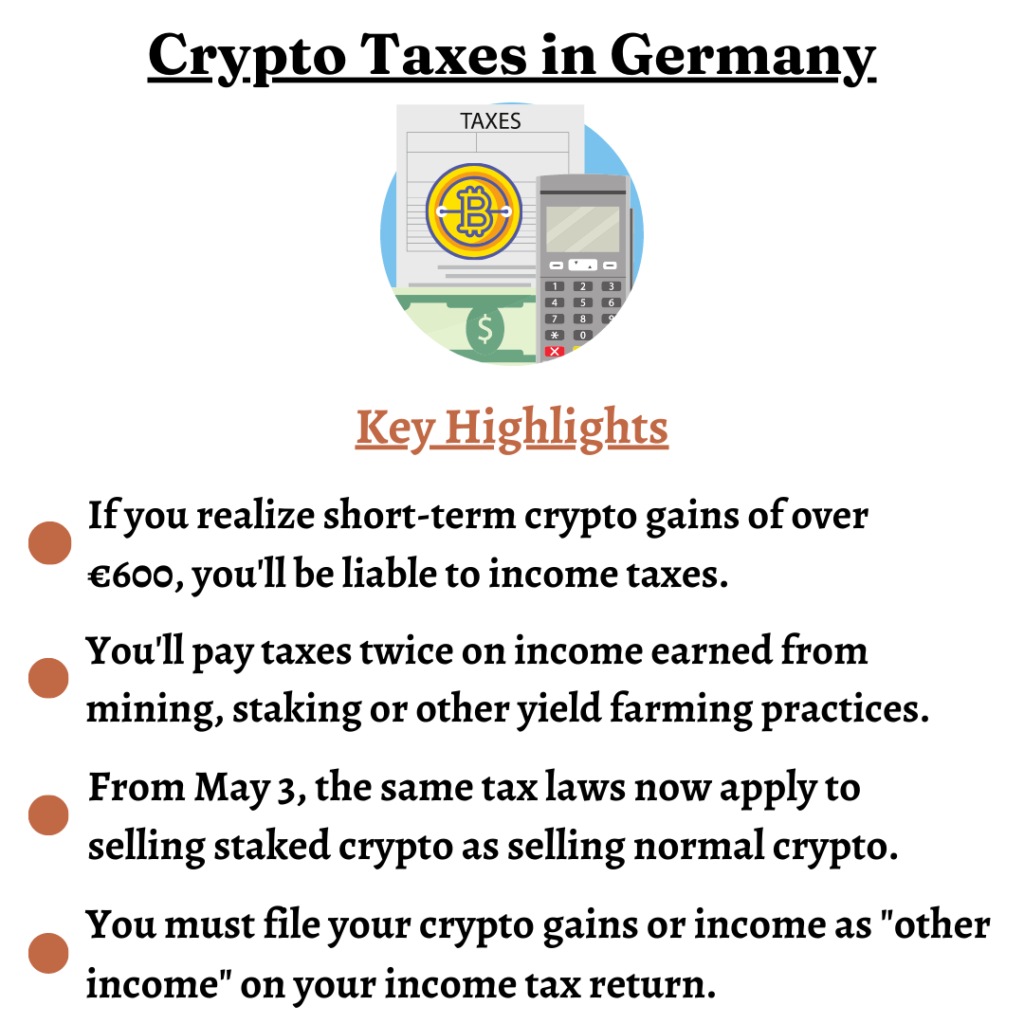Crypto Taxes in Germany: The Complete Tax Guide
- How Does the German Federal Central Tax Office View Crypto?
- How is Crypto Taxed in Germany?
- How to Calculate Crypto Taxes in Germany
- Crypto Taxable Events in Germany
- Tax-Free Crypto Transactions in Germany
- How to Avoid Crypto Taxes in Germany?
- How to Pay Crypto Taxes in Germany
- Is Germany a Crypto Tax Haven?
This is how crypto taxes in Germany works in a nutshell –
If you sell your crypto the same year of purchasing it and gain a profit of €600, you’ll be liable to ordinary income taxes under the German Tax Acts.
Germany has seen a lot of changes and modifications in its crypto tax laws, but overall, it’s still one of the most progressive and crypto-friendly sets of tax regulations in the world.

In this article, we’ll find out:
- How crypto taxation in Germany work
- Different crypto taxable and non-taxable events
- Can you avoid crypto taxes?
- How to report your crypto taxes in Germany
How Does the German Federal Central Tax Office View Crypto?
Firstly, crypto is not a legal tender in Germany. The German Federal Central Tax Office views crypto as private money or assets, not property or commodity.
How is Crypto Taxed in Germany?

As we mentioned before, crypto is taxable in Germany only if you sell your crypto assets within a year of purchasing them and if you gain more than €600.
So, if your gains don’t total up to €600, you don’t pay any taxes.
Also, since crypto is treated as private money, which comes under “other assets”, selling it will cause a “private disposal” event.
And under the German Tax Acts, income earned from selling your “other assets” after a year of purchasing it is tax-exempt.
Sounds confusing?
Well, to put it simply, your long-term gains from crypto are tax-exempt.
Other than that, income earned from mining, staking or other yield farming practices is also subject to ordinary income taxes.
Also worth mentioning, earlier, Germany’s crypto tax laws stated that if you have previously staked your crypto or used it in liquidity pools or lending pools to earn interests, you’ll have to hold that crypto for more than ten years to qualify for tax-exemption.
However, on May 3, this has now changed. Now, staked crypto is also tax-exempt after a year.
How to Calculate Crypto Taxes in Germany
Calculating crypto taxes in Germany is pretty straightforward.
Just subtract your selling price from the price you bought it for. If you realize a gain of more than €600, you’ll be liable to income taxes, assuming you sell it within the same year of purchase.
Depending on your income bracket, income tax rates in Germany range from 14%-45%. Also, under the German Tax Acts, you must pay a maximum of 5.5% solidarity tax.
One key distinction here is that income earned from mining, staking or interests from lending pools aren’t treated the same as gains from selling crypto.
Any income earned from these practices will be treated as your standard income. Only when you sell this crypto will you trigger a private disposal event.
In simple words, you’ll pay taxes twice. First when you receive the income and second when you sell it.
If all of this sounds too confusing for you, consider using Bitcoin.Tax.
Bitcoin.Tax automatically collects all your transactions, calculates your taxes, and creates a tax report for you, while you can just sit back and relax.
Crypto Taxable Events in Germany

If you know the basics of how crypto taxes in Germany work, you can figure out the tax consequences of any crypto transactions. However, some scenarios are not that straightforward.
The following are some recurrent crypto taxable events and their tax consequences that you should know about.
Getting Paid in Crypto
The tax consequences for getting paid in crypto are not quite clear. But from the guidelines and framework available to us, it seems that getting paid in crypto will require you to pay income taxes.
It’s similar to what we discussed in the income earned from mining and staking situation.
Swapping Crypto
Exchanging one crypto for another is a taxable event because when swapping crypto, you’re essentially selling (disposing of) your crypto to buy another. So, the same tax laws apply when you sell crypto for fiat currency.
Also, note that when you swap crypto, that would be your new date of purchase for that particular crypto.
For example, suppose you bought 2 BTC in January and swapped it for 10 ETH in July.
When you sell those 10 ETH, its purchase date would be in July, not January.
Buying Products/Services with Crypto
Once again, paying for a product or service with cryptocurrency is a taxable event because you’re essentially disposing of your crypto. Unless you’re transferring crypto from your wallet to the vendor’s, in that case, it’s not a taxable event.
Tax-Free Crypto Transactions in Germany
The following are some crypto transactions that have no tax consequences.
Buying and Holding Crypto
Buying crypto is not a taxable event in Germany, and neither is holding it. Only when you sell it do you pay taxes.
Transferring Crypto Between Wallets
As mentioned briefly before, transferring crypto from one wallet to another is not a taxable event.
Gifting Crypto
Gifting crypto is not taxable for the most part. If the value of your gift exceeds €20,000 for friends and €500.000 for spouses, you’ll be liable to taxes under the Schenkungssteuer act.
Tax rates on crypto gifts range from 7% to 50%, depending on who you gift it to.
How to Avoid Crypto Taxes in Germany?
In the US and Canada, the IRS and CRA work with most of the centralized exchanges to extract data and track information and identities to prevent money laundering, tax evasions and other illegal activities.
The German Federal Central Tax Office also does the same.
So, if you’re planning to avoid crypto taxes in Germany, know that the government will probably find out, and you may end up facing criminal charges, even if you use decentralized exchanges.
Decentralized exchanges don’t make you invisible to the law and what you’re doing with your crypto. To know more about this topic, check out the article on tax reporting differences in CEX vs DEX exchanges.
So, the smart and right thing to do is pay all your crypto taxes accurately and honestly.
How to Pay Crypto Taxes in Germany
You should file your crypto gains or income as “other income” on your income tax return, separate from your main income declaration form.
Is Germany a Crypto Tax Haven?
Whether Germany is a crypto tax haven or not depends on how you define a crypto tax haven.
There are countries with even better, more favorable crypto tax regulations. Some countries are even tax-free for crypto.
So, when compared to them, Germany may not stand out as a crypto tax haven. But it’s still one of the most crypto-friendly countries in the world for sure.